Background
The Conference of the Parties (COP), at its twenty-first session in Paris in 2015, invited the Intergovernmental Panel on Climate Change (IPCC) to provide a special report in 2018 on the impacts of global warming of 1.5 °C above pre-industrial levels and related global greenhouse gas emission pathways (decision 1/CP.21, paragraph 21).
The IPCC, in response to the invitation by the COP, produced a Special Report entitled: “Global Warming of 1.5°C, an IPCC special report on the impacts of global warming of 1.5°C above pre-industrial levels and related global greenhouse gas emission pathways, in the context of strengthening the global response to the threat of climate change, sustainable development, and efforts to eradicate poverty.” The Summary for Policymakers (SPM) was approved by the IPCC plenary on 6 October 2018 at the closing of its forty-eighth session, held in Incheon, the Republic of Korea.
An informal information note has been produced by the SBSTA and IPCC Chairs to outline the agenda and to provide further background information on the Special Event.
Details
The event will be open to Parties and observers, and will be webcast.
It will focus on unpacking the new scientific concepts and definitions used in the report and hence generate a better understanding of the key scientific findings of the report. It may also allow for identifying research gaps and clarifying the uncertainties associated with specific findings.
To achieve those goals, the special event will be organized as a fact-finding exchange of views between IPCC experts and Parties. The experts will present findings from the IPCC Special Report on Global Warming of 1.5°C, focusing on new scientific findings and their context. After presentations have been made, a moderated discussion will then allow an exchange with the room and questions from all participants. To ensure that this can be an interactive learning exercise, we invite Parties and observers to keep their interventions succinct and to ask the experts questions that pertain to the findings of this report.
After the event, a summary report will be prepared under the authority of the SBSTA and IPCC Chairs, which will be made available on the UNFCCC web site in early 2019.
Draft agenda
| Opening and welcome |
| 15:00 – 15:15 |
Welcome remarks and opening of the event by the SBSTA and the IPCC Chairs.
Keynote remarks by the Executive Secretary.
|
Paul Watkinson (SBSTA Chair),
Hoesung Lee (IPCC Chair),
Patricia Espinosa (UNFCCC Executive Secretary)
|
| Unpacking the new scientific knowledge and key findings |
| 15:15 – 15:55 |
Understanding global warming of 1.5°C
- Presentation (10–15 minutes)
- Open discussion (25 minutes)
|
Presentation by Valérie Masson-Delmotte and Panmao Zhai (WGI Co-Chairs) |
Presentation |
| 15:55 – 16:35 |
Projected climate change, potential impacts and associated risks
- Presentation (10–15 minutes)
- Open discussion (25 minutes)
|
Presentation by Hans-Otto Pörtner (WGII Co-Chair)
|
Presentation |
| 16:35 – 17:15 |
Emission pathways and system transitions consistent with 1.5°C global warming
- Presentation (10–15 minutes)
- Open discussion (25 minutes)
|
Presentation by Jim Skea (WGIII Co-Chair) |
Presentation |
| 17:15 – 17:55 |
Strengthening the global response in the context of sustainable development and efforts to eradicate poverty
- Presentation (10–15 minutes)
- Open discussion (25 minutes)
|
Presentation by Debra Roberts (WGII Co-chair) |
Presentation |
| Closing |
| 17:55 – 18:05 |
Closing remarks by the SBSTA Chair and the IPCC Chair
|
Paul Watkinson and Hoesung Lee |
